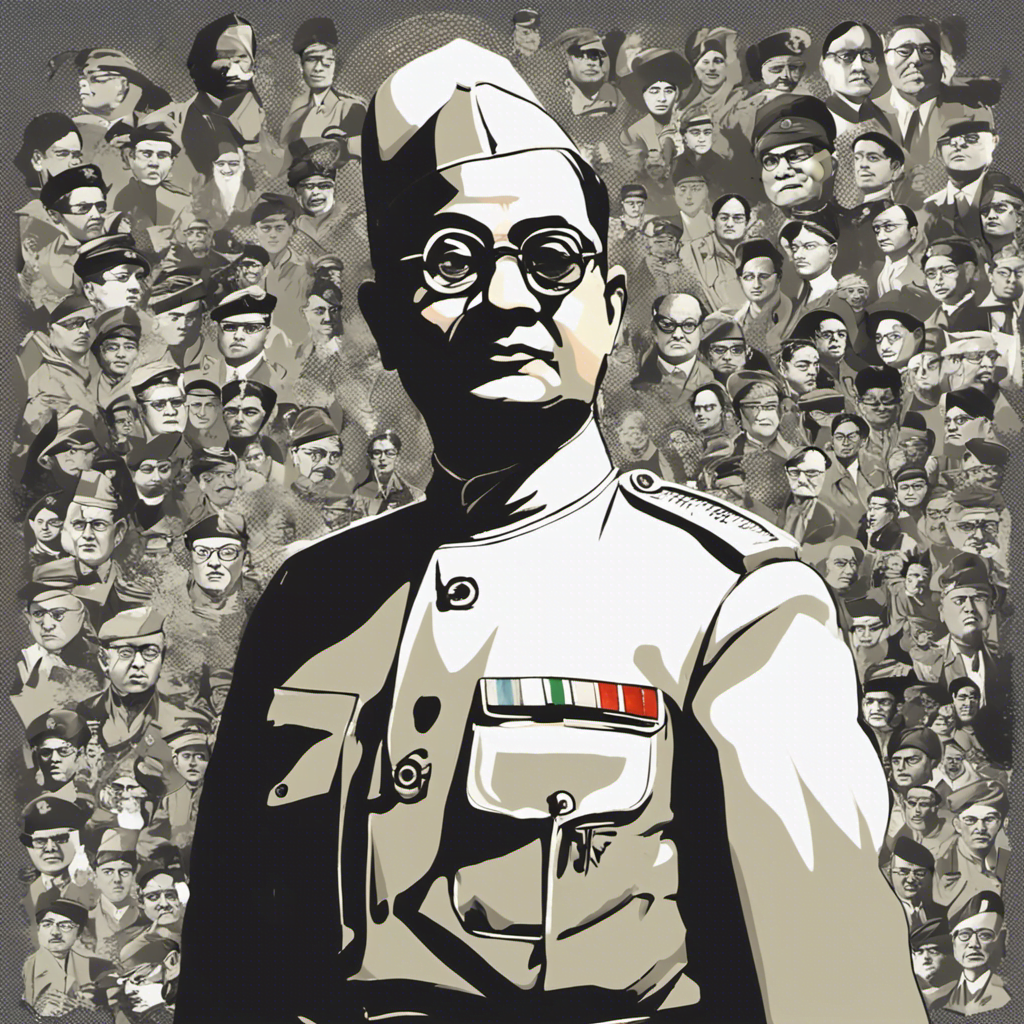Table of Contents
Introduction
As India’s battle for independence raged in the early 20th century, Netaji Subhas Chandra Bose emerged as a towering figure with a sharp intellect and a fierce determination to free India from British colonial rule.
Bose’s leadership of the Indian National Army (INA) his ideological differences with the Congress Party and his vision for a secular India have left a lasting and captivating legacy.

This blog aims to provide an in-depth analysis of Bose’s contributions to politics, culture, leadership and shaping India’s national identity. Let’s delve into the world of this enigmatic historical figure and examine how his ideas have influenced modern India sparking thought-provoking discussions, along the journey.
Political Legacies of Subhas Chandra Bose
Subhas Chandra Bose played a role in India’s fight for independence by employing innovative and bold strategies to challenge British colonial rule. One of his contributions was leading the Indian National Army (INA) to combat the British and restore India’s sovereignty.
Bose’s leadership of the INA ignited enthusiasm motivating numerous Indians to actively participate in the armed struggle, for freedom.
However, Bose’s militant tactics often put him at odds with the more established Indian National Congress, which preferred more non-violent means of resistance.
Bose eventually split from Congress to form his party, the Indian National Army (Forward Bloc), and pursued a more radical and revolutionary agenda.
Bose’s strong dedication to India’s freedom and his willingness to use assertive strategies were evident in his decision to break away from Congress. He not led the INA but also left a remarkable legacy, as a revolutionary leader by employing innovative and determined approaches to overthrow British rule.

He travelled to Japan and Germany to form alliances and obtain military support for the INA and also worked tirelessly to recruit Indian soldiers and supporters for the armed struggle. Bose realized that India’s struggle required a leader with strength and vision someone who could motivate their countrymen to stand up against the British rulers.
Thus, Bose’s political legacies centre around his leadership of the INA, his split from the Congress party, and his revolutionary methods in the fight for India’s independence. These legacies not only established him as an uncompromising and determined freedom fighter but also helped shape India’s national identity and ethos in the years to come.
Cultural Legacies of Subhas Chandra Bose
Bose’s intense patriotism and dedication played a role in shaping India’s cultural identity filling the nation with pride. It was under his leadership that important national symbols such as the flag, national anthem and the uniform of the Azad Hind Fauj came into existence fostering a profound sense of love, for one’s country among Indians. Bose’s mantra of ’Jai Hind’ became a rallying cry for many across the nation.
Under his guidance, the INA brought together people from backgrounds including various ethnicities and religions. This fostered a sense of togetherness among communities all working towards a shared objective. It further emphasized the concepts of inclusivity and secularism in the fight, for freedom.

Today the uniform of the Azad Hind Fauj still stands as a representation of bravery and courage honoring the sacrifices made by Bose and his followers—the national. Flags serve as powerful reminders of India’s independence and unity. Boses cultural contributions continue to inspire and ignite a sense of pride among Indians solidifying his status as an iconic figure even, in present times.
Visionary Legacies of Subhas Chandra Bose
Subhas Chandra Bose was not just a leader of India’s independence movement – he was a visionary who had radical ideas for the nation’s future. Bose had a vision for India that went beyond the fight for independence from British rule. His vision encompassed secular principles with the well-being of the people, as the top priority.
Bose believed in the distribution of India’s resources among its people, which formed the basis of his socialist vision. He advocated for the nationalization of industries and the implementation of state oversight, in trade and commerce. Furthermore, he highlighted the significance of fostering an encompassing society that values and acknowledges the beliefs upheld by every community.
Bose was not just focused on India. He also had a global perspective. He grasped the importance of establishing connections, with the global community. Bose envisioned India as a leader on the stage and promoted its involvement in resolving conflicts between other nations. His belief in a unified world was remarkably progressive, for his era.
Today Boses visionary legacies continue to hold significance. As India confronts challenges related to disparity and religious tension his principles of socialism and secularism provide a valuable foundation for progress. His looking perspectives on India’s global role also serve as a source of inspiration for the country’s aspirations in foreign policy.
In essence, Bose’s aspirations for an empathetic and forward-thinking India present a significant roadmap, for the future of the nation.
Contemporary Relevance of Subhas Chandra Bose’s Legacies
The legacies of Subhas Chandra Bose remain significant in present-day India. His political beliefs and his vision of a socialist India have greatly influenced the formulation of policies in India.
By employing strategies Bose questioned conventional political ideologies and laid the groundwork for more progressive ideas, within the Indian independence movement.
In today’s world, Bose’s vision of an India with a global perspective and a focus on technological progress continues to hold significance. As India works towards becoming a superpower Bose’s vision acts as a guiding light, for both policymakers and citizens.
However, it’s important to note that the impact of his contributions goes beyond policies and governance. Bose’s leadership and lasting influence have also played a role, in shaping India’s collective story and sense of identity.
His talent for inspiring a sense of pride questioning imperialism and imbuing Indian culture with solid symbols and values that could withstand the influence of colonialism has had a long-lasting effect, on the nation.
In a society grappling with questions about identity and the sense of being a nation Bose’s legacy reminds us of India’s cultural heritage and the numerous heroes who fought to protect it. Furthermore, Bose’s vision for an inclusive and secular India paves the way for an India that embraces diversity in thoughts, languages and cultures.
As we envision the future Bose’s legacies serve as a compass for India’s policymakers, citizens and leaders. It is, through his vision, bravery and leadership that India continues its pursuit of a fairer just and democratic society.
Assessment of Subhas Chandra Bose’s Legacies
Subhas Chandra Bose left behind a range of legacies that cover various areas such as leadership, cultural identity, social justice and global vision. His diverse legacy was significant not during the Indian independence movement but also continues to inspire and spark conversations, among Indians even in present times.
Bose’s role in India’s narrative cannot be emphasized enough. He was a leader whose revolutionary strategies confronted British dominance and broadened the horizons of the Indian independence movement. By leading the Indian National Army (INA) he established a determined force that symbolized optimism and defiance, in the face of colonial rule.
Furthermore, Boses progressive and inclusive vision, for India was ahead of its era demonstrating his dedication to social fairness and equal opportunities.
However, as is the case with any historical figure, Bose’s legacy is not without its controversies. There have been discussions regarding visionary ideas and strategies employed by him, especially his partnership with fascist regimes in Europe and Asia during World War II.
Some consider this to be a departure from the core values of nationalism while others contend that Bose’s actions played a vital role, in achieving India’s independence.
Regardless of the different perspectives on Bose’s legacies, his prophetic vision for India, particularly his ideas on democracy, economic development, and global cooperation, remain relevant and inspiring even today.
The groundbreaking efforts he embarked upon to mould the identity and principles of the country still have a profound influence, on the contemporary Indian story.
When you look back on everything Bose did, you can’t help but be impressed. I mean, the way he fired up the public and pushed hard for India’s independence – super inspiring stuff. And we can’t dismiss how he kept advocating for the poor and discriminated.
No question, this guy made a ton of bold moves during his time. While certain aspects of his ideas may spark debate there is no denying that Bose’s thinking vision for a free, fair and righteous India continues to serve as a guiding light, for all Indian citizens.
Conclusion
Even today, Netaji Subhas Chandra Bose is still considered a leader who motivates younger generations with his beliefs, morals, and forward-thinking viewpoint. His leadership of the INA, his departure from Congress and his revolutionary methods have had a lasting impact on India’s struggle for independence.
Bose’s contribution to India’s identity and values through symbols forceful leadership and challenging British rule has left an indelible mark. Bose was really into socialist and secular thinking.
He liked to keep up with world news too. I suppose staying up to date on global affairs helped turn him into such a prominent leader both in India and worldwide. Bose’s relevance, in shaping India’s policies, ideals and national narrative remains significant igniting thoughtful debates and discussions.
Netaji Bose was staunchly committed to freeing India from British rule during his lifetime. Even today, people continue to find motivation in the forward-thinking vision Netaji Bose had for building a just and equitable society in India after independence.
FAQS On Netaji Subhas Chandra Bose
Q1. What were some of Subhas Chandra Bose’s key contributions to India’s independence movement?
The leadership of INA, advocated militant resistance, forging alliances with Axis powers, and promoting inclusive nationalism.
Q2. Who was Subhas Chandra Bose?
Indian nationalist leader, head of the Indian National Army during the independence movement.
Q3. When was Subhas Chandra Bose born?
He was born on 23 January 1897 in Cuttack, Odisha.
Q4. Where was Subhas Chandra Bose born?
Bose was born in Cuttack, which was part of the Bengal Presidency under British India.
Q5. What cultural legacies did Bose help establish for India?
The national anthem, flag, INA uniforms, and ‘Jai Hind’ slogan contributed to national identity.
Q6. What was Bose’s vision for India after independence?
Socialist state, secularism, global leadership role, empowerment of women and lower castes.
Q7. When did Subhas Chandra Bose die?
He died on 18 August 1945 in a plane crash in Taipei, Taiwan.
Q8. How did Subhas Chandra Bose die?
Bose died in an alleged plane crash soon after takeoff from Taihoku Airport in Taiwan.
Q9. Which of Bose’s ideas influenced India’s policy after independence?
Socialist economics, state intervention, secularism, non-alignment movement.
Q10. Why does Bose remain an iconic figure in India today?
Courageous leadership inspired masses. The vision of an egalitarian, independent India resonates today.
There is more to learn about the life of the great freedom fighter Bhagat Singh beyond his martyrdom. This blog will uncover fascinating unknown facts and provide insights into his writings and radical thinking. Don’t miss out, click here to read the blog now and discover the revolutionary philosophy of Bhagat Singh
READ MORE TOPICS ON MULTISEEKS.COM







